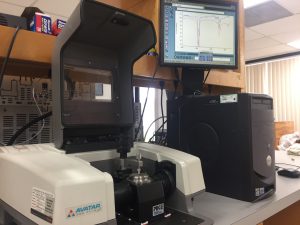Fourier Transform Infrared Spectroscopy/FTIR
FTIR Services:
 ECA has two FTIR instruments with extensive search libraries for each instrument. We have the capability for liquid or gas sample analysis by sodium chloride plate or cell. Solid analysis by potassium bromide pellet or attenuated total reflectance (ATR). FTIR is widely used for polymer and material analysis. We employ FTIR to identify chromatographically separated fractions of unknown formulations to help in the product deformulation process. FTIR is also quite useful for identification of organic chemicals as it provides a “fingerprint” of the compounds which allows for assurance as to the identity of most organic chemicals. FTIR is commonly used as an identification test for many USP or NF pharmaceutical chemicals (<USP 197>). FTIR can also be used as a quantitative method for the quantification of some polymers.
ECA has two FTIR instruments with extensive search libraries for each instrument. We have the capability for liquid or gas sample analysis by sodium chloride plate or cell. Solid analysis by potassium bromide pellet or attenuated total reflectance (ATR). FTIR is widely used for polymer and material analysis. We employ FTIR to identify chromatographically separated fractions of unknown formulations to help in the product deformulation process. FTIR is also quite useful for identification of organic chemicals as it provides a “fingerprint” of the compounds which allows for assurance as to the identity of most organic chemicals. FTIR is commonly used as an identification test for many USP or NF pharmaceutical chemicals (<USP 197>). FTIR can also be used as a quantitative method for the quantification of some polymers.
Fourier Transform Infrared (FTIR) spectroscopy is a technique that is based on molecular absorption of infrared photons that excite vibrations in different chemical functional groups. The pattern of adsorption at various wavelengths, spanning the entire infrared region, are unique for each chemical substance. FTIR can be used to identify many chemical substances and even some combinations of chemicals or formulations. The following is a list of at least some of the types of chemical substances that we have used FTIR to identify:
1. Synthetic Polymers (PET, Nylon, Silicone, PFA, PE, and many others) Identification
2. Natural Polymers (cellulose, polysaccharides, proteins, and others) Identification
3. Coatings
4. Phthalates and other Polymer additives
5. Unknown Drug Substance Identification
6. Organic Chemical Identification
We also have the experience and expertise to carry out projects using FTIR to detect irregularities in organic mixtures after various treatments. FTIR is also commonly utilized to provide the identification in various types of monograph testing including the USP, EU, JP testing of pharmaceutical products and many ASTM and ACS specifications as well.
We usually ask for at least 0.2 mg of sample to use for FTIR analysis.
